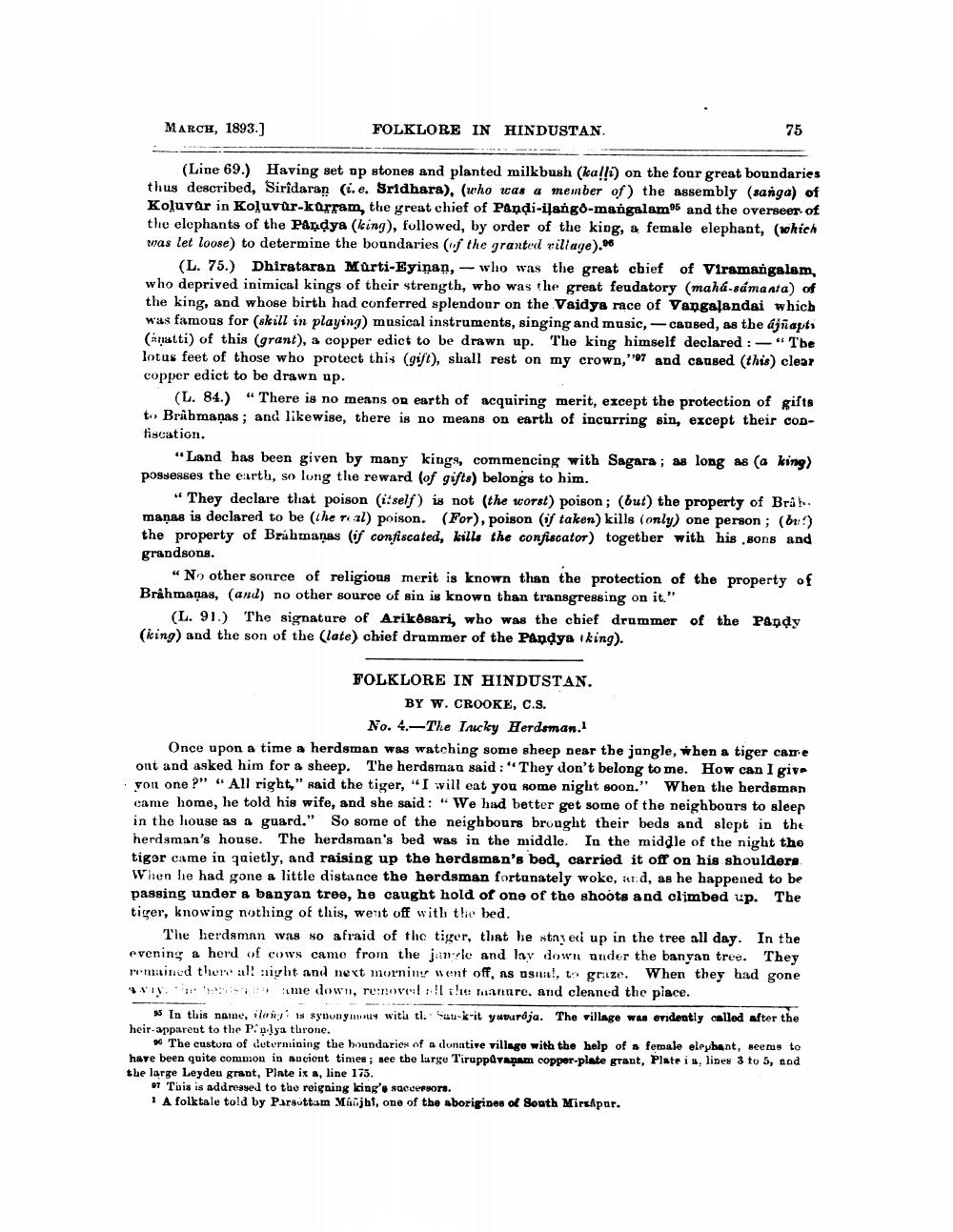________________
MARCH, 1893.)
FOLKLORE IN HINDUSTAN
75
(Line 69.) Having set op stones and planted milkbush (ka!!) on the four great boundaries thus described, Siridaran (i.e. Sridhara), (who was a member of the assembly (sanga) of Koluvur in Koluvür-karram, the great chief of Pandi-ilangó-mangalamos and the overseer of the elephants of the Pandya (king), followed, by order of the king, a female elephant, (which was let loose) to determine the boundaries of the granteil village).
(L. 75.) Dhirataran Marti-Eyinan, - who was the great chief of Viramangalam, who deprived inimical kings of their strength, who was the great feudatory (mahá-samanta) of the king, and whose birth had conferred splendour on the Vaidya race of Vangalandai which was famous for (skill in playing) musical instruments, singing and music, -caused, as the ájaapts (anatti) of this grant), a copper edict to be drawn up. The king himself declared : -" The lotus feet of those who protect this (gift), shall rest on my crown,'97 and caused (this) clear copper edict to be drawn up.
(L. 84.) “There is no means on earth of acquiring merit, except the protection of gifts t. Brahmaņas ; and likewise, there is no means on earth of incurring sin, except their confiscation.
“Land has been given by many kings, commencing with Sagara; as long as (a king) possesses the earth, so long the reward (of gifts) belongs to him.
"They declare that poison (itself) is not (the worst) poison ; (but) the property of Brab. maņas is declared to be the rial) poison. (For), poison (if taken) kills (only) one person ; (6) the property of Brühmaņas (if confiscated, kills the confiscator) together with his sons and grandsons.
“No other sonrce of religious merit is known than the protection of the property of Brahmaņas, (and) no other source of sin is known than transgressing on it."
(L. 91.) The signature of Arikosari, who was the chief drummer of the Paody (king) and the son of the (late) chief drummer of the Pandya iking).
FOLKLORE IN HINDUSTAN.
BY W. CROOKE, C.S.
No. 4.-The Trucky Herdsman. Once upon a time a herdsman was watching some sheep near the jungle, when a tiger carre ont and asked him for a sheep. The herdsman said: "They don't belong to me. How can I give · you one?” “ All right," said the tiger, "I vill eat you some night soon." When the herdsman
came home, he told his wife, and she said: “We had better get some of the neighbours to sleep in the house as a guard." So some of the neighbours brought their beds and slept in the herdsman's house. The herdsman's bed was in the middle. In the middle of the night the tiger came in quietly, and raising up the herdsman's bed, carried it off on his shoulders When lie had gone a little distance the herdsman fortunately woke, and, as he happened to be passing under a banyan tree, he caught hold of one of the shoots and climbed up. The tiger, knowing nothing of this, went off with the bed.
The herdsman was so afraid of the tiger, that he stayeci up in the tree all day. In the evening a herd of cows came from the janrle and lay down ander the banyan tree. They remained there all iyht and next morning went off, as usual, to grize. When they had gone NIX .
me down, renoveel!l the manure, and cleaned the place. In this name, tony » synonymous with tl. u--it yuturdja. The village wus evidently called after the heir apparent to the Palya throne.
* The custura of determining the boundaries of a donative village with the help of a female elephant, seems to have been quite common in ancient times; see the large Tiruppavanam copper-plate grant, Plate is, lines 3 to 5, and the large Leydeu grant, Plate ix a, line 175.
07 Tois is addressed to the reigning king'o saccersors. 1 A folktale told by Parsuttam Majhf, one of the aborigines of South Mirzapur.




